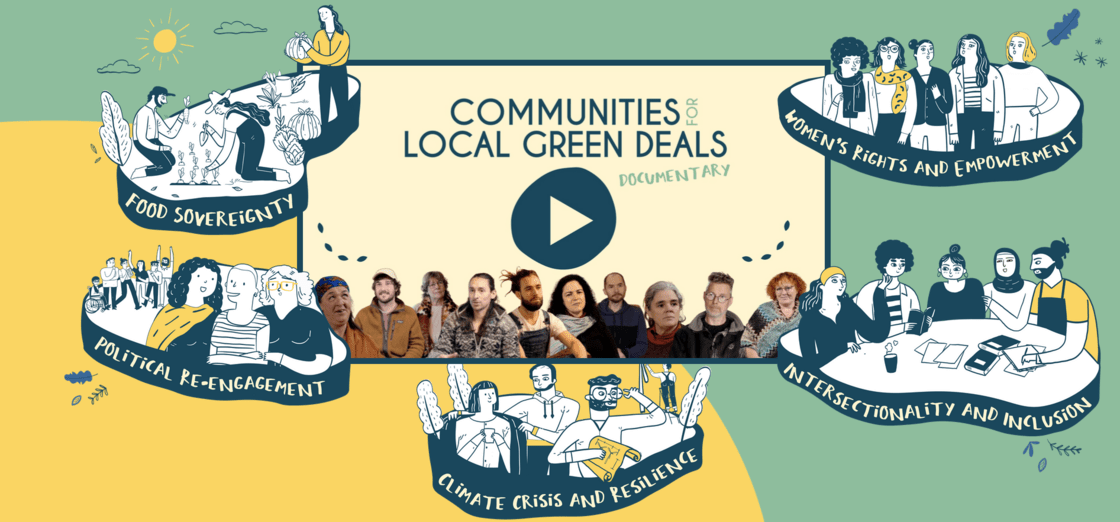
Communities for Local Green Deals: An Interactive Documentary on Community Power
Across Europe, people in local communities are building new food systems, reclaiming political agency, standing for gender justice, and nurturing resilience in the face of climate breakdown. They are not waiting, but leading the way. Communities for Local Green Deal is a European project that emphasises that real sustainability must be rooted in local community action and democratic participation. Produced in collaboration between GEN Europe, ECOLISE, ICLEI Europe, ISCTE - University Institute of Lisbon, ECON and ELARD, this interactive documentary will take you on a journey to meet the people creating just and sustainable futures through personal stories and grounded experiences in their own neighbourhoods, farms, forests, and town halls. Accompanied by an interactive website that shares resources, events and stories that showcase a personal and empowering exploration of community-driven initiatives, this experience centers the lived expertise of changemakers who embody what a Green Deal can look like when it grows from the ground up.
Food Sovereignty
Adrian Areta, who lives in an ecovillage, and Baratzan Blai, a sustainable agriculture project powered by local communities, remind us:
“The only power we have as consumers is to choose not to buy from those supermarkets, not to buy these products that you don’t know where they’re coming from. So, know your farmer, know your distribution and you can be sure that you are contributing to a better world.”
Johannes Kuebel, founder of Lightwave, explains how their online marketplace helps regions form cooperatives to connect farmers directly with communities, restaurants, and stores, reducing pressure from big supermarkets:
“With changing the system of how they interact, the two ends, we can change the power structures in the food system.”
Political Re-engagement
Camilla Nielsen-Englyst lives in a small ecovillage outside Copenhagen and shares a hopeful shift in political trust:
“People have lost faith in national politics, maybe also European. But on a local level I think trust is more there, it’s closer to our everyday life. It’s people we know.”
She reflects on the journey of her community:
“We were the strange ones. The weird ones etc. We wanted to have an energy community, clean our own water, sort our waste in many more fractions than the municipality would do… Now this is mainstream. We moved through those last 20 years from a place of opposition to a place of more like support.”
Ana Margarida Esteves, a scholar-activist working to bridge humanities and natural sciences, stresses the importance of localizing policy:
“In order to face the polycrisis that we are going through [...] we need a radical transdisciplinarity and we need to rediscover what it means to be a generalist.”
She adds:
“We need to bring policy back into the local context [...] community-led initiatives are doing this by concretizing the Green Deal and adapting it to the particularities of their local contexts.”
Climate Crisis and Resilience
Marc Pleyser, part of the Ferme Légère (Light Farm) collective, offers a grounded view on resilience:
“In 2020, when everyone found themselves confined I thought to myself, we at the Ferme Légère are ready for this. For us, it went by, but smoothly.”
He highlights the urgency of preparedness:
“Resilience is being prepared for what is coming very soon, not trying to prepare for something that would happen in 10 or 20 years.”
Maxime Zalevski, who founded the Ecovillage Network Ukraine, shares how their community adapted quickly when war hit:
“We started to think about our problems in layers. The first layer was food — how to grow food. We had more than 3000 refugees who came to our ecovillages.”
Intersectionality and Inclusion
Genny Carraro, from the Arterra ecovillage, explains their inclusive approach:
“One of our aims is to be able to include intersectionality, to understand what it means and to really include it in our way of living, in our decision making.”
Matteo Zampatti, active in GEN Europe and the youth branch NextGen, brings the perspectives of young ecovillagers to the movement, ensuring diverse voices shape the future.
Women’s Rights and Empowerment
Mieke Elzenga, founder of LiberTerra, shares a vision of leadership based on connection:
“Masculine leadership is more about reaching a goal and feminine leadership is more about finding the connection and when you do have the connection, you can make the next step together.”
Mauge Caniada, facilitator and conflict mediator from Arterra, challenges traditional governance models:
“The topic is not about the presence of women in power roles, it’s about what perspective we use to develop the governance models [...] we try to see governance from a feminist perspective.”
Watch the documentary to be inspired by stories of local action here: https://communitiesforlocalgreendeals.ecolise.eu/
Take the survey to contribute your voice to the conversation on community-led change.
This project is funded by the Citizens, Equality, Rights and Values (CERV) programme under the European Education and Culture Executive Agency (EACEA).